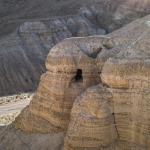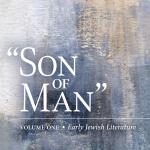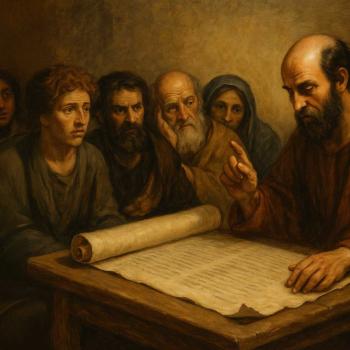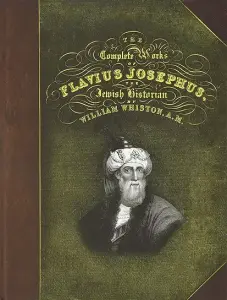
[This article is post #6 of my review of Dr. Richard Bauckham’s book, which is important for Christology, entitled “Son of Man:” Volume 1: Early Jewish Literature (Eerdmans, 2003). This book is the first of a two-part series, with no date given by the American publisher Eerdmans for the future publication of Volume 2. It will be about Jesus as the Son of Man in the New Testament. Click here to go to post #1.]
The title of this post is a chapter title in Dr. Bauckham’s book, “Son of Man.” I was surprised reading this chapter because it informs that Josephus, an eminent Jewish historian of the late 1st century CE, was an excellent exegete of Jewish scripture (Tanakh=Old Testament), and I didn’t know this. I knew he was the premier historian of the first century CE regarding the nation of Israel and how it related to the Roman Empire. But even though I have in my library, Josephus: Complete Works, and I refer to it from time to time, there is a lot I didn’t know about this very interesting man.
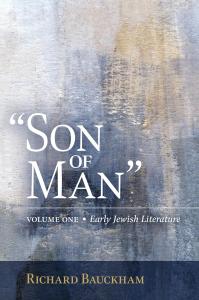 Was Josephus a Traitor to His Religion or Faithful to His God?
Was Josephus a Traitor to His Religion or Faithful to His God?
Josephus had been a Jewish priest who descended from a line of priests. Then he was a general in Israel’s armed forces when the First Jewish Revolt of 66-73 CE occurred. In 67 CE, he was stationed in the Galilean town of Jotapata (=Yodfat) when Israel’s military was defeated in Galilee by the Roman forces of General Vespasian, who soon became emperor (reign: 69-79). Josephus had prayed about what to do. Then he hid in a cave with other Jews and surrendered. He then became a Roman citizen employed by Emperor Vespasian and his son, Titus, as an advisor and an historian about Israel. Because of this, Jews generally have regarded Josephus as a traitor. I think otherwise.
Josephus: The Jewish Revolt Was Against Tanakh
Josephus claims that prior to his surrender, he increasingly was becoming convinced that the Jews would lose this war against the Roman Empire. He explains in War of the Jews (6.312-313), “But what more than anything else incited them to go to war was an ambiguous oracle also found in their holy scriptures, which revealed that at the time someone from their country would become ruler of the world. They took this to mean someone of their own race, and many of their scholars followed this wrong path of interpretation. In fact the oracle was pointing to the principate of Vespasian, who was in Judaea when he was proclaimed emperor.” Indeed, this First Jewish Revolt was a messianic uprising just as the Second Jewish Revolt of 132-135 was, which resulted in the Diaspora.
Bauckham relates that Josephus did not reveal what “oracle” he referred to in Jewish scripture. The professor says it must have been either Genesis 49.10 (NRSV: “The scepter shall not depart from Judah, nor the ruler’s staff from between his feet, until tribute [or Shiloh] comes to him”), or Balaam’s prophecy in Numbers 24.17, 19 (“A star shall come out of Jacob, and a scepter shall rise out of Israel;… One out of Jacob shall rule and destroy”). Bauckham further relates (p. 339), “We know that Halley’s Comet appeared in 66 CE,” and “it would have been visible for about seventy-one days.” He concludes (p. 341), “So, when we put the ‘ambiguous oracle’ together with the comet, we need look no further than Numbers 24:17 for the source of the prophecy.”
Josephus: A Big Believer in the Book of Daniel
Josephus had special interest in the prophecies about the nations in the book of Daniel. But he appears to have been conflicted in his effort to avoid accusing the Roman Empire of the being the fourth and final beast of Daniel 7.7. In his book, Antiquities of the Jews (10.267), Josephus cites Daniel as being most distinctive among all the prophets because “not only did he keep prophesying the future, like the other prophets, but he also determined the time when these things would come about.” Here, Josephus must have referred to the “70 weeks” of Daniel 9.24-27, which represents 490 years. Bauckham therefore interjects (p. 343), “It is very likely that many people involved in the revolt thought about Daniel’s prophecy of the seventy weeks, which could be calculated to end around this time, and Josephus would have been among them.”
Josephus: An “Ingenious” Exegete of Scripture
Bauckham praises Josephus (p. 346) for some “ingenious exegesis” of the book of Daniel. He relates (p. 347), “Josephus was convinced that the destruction of Jerusalem and the temple was divine punishment for the sins of the revolutionary leaders in particular, but also of the people in general, whom they persuaded to follow their lead.”
On the other hand, although Josephus often said his duty as a historian was to record the past and not predict the future, Bauckham relates (pp. 350-351), “Josephus did not want to offend his Roman readers.” Yet in his “account of Nebuchadnezzar’s dream [in Daniel 2], he leaves no doubt that the Roman empire was destined to be destroyed…. What Josephus withholds is the identity of the empire the stone represents,” which is the kingdom of God. Josephus argued that this prophecy portrays that this “eternal kingdom will not be brought about by human agency but solely by divine agency.” I would modify that by saying God will bring it about, but he will do so through human agency, that is, with Jesus of Nazareth as his agent par excellence.
Bauckham again claims (p. 358), “Josephus, the aristocratic priest from Jerusalem,” was “an expert exegete” of the Jewish scriptures. He says Josephus cites Moses’ poem in Deuteronomy 32.1-43 about Israel’s apostasy and quotes God as saying, “I will hide my face from them, I will see what their end will be; for they are a perverse generation, children in whom there is not faithfulness. They made me jealous with what is no god, provoked me with their idols. So I will make them jealous with what is no people, provoke them with a foolish nation” (NRSV, vv. 20-21). From the Christian perspective, the “no people” and “foolish nation” refers to Christians. The apostle Paul quotes this last sentence and applies it to Christians in Romans 10.19. Bauckham says concerning what Moses wrote here (p. 359), “Josephus will certainly have read this as predicting the events of 66-73 CE and the future downfall of the Roman Empire.”
Bauckham further relates (pp. 360-361) in The Wars of Jews (6.250, 267-268), “Josephus frequently alluded to the parallels between the two destructions” of Jerusalem and its temple by the previous Babylonians and Romans, “extending even to the fact that they occurred on the same day of the year.” Bauckham says Josephus was not alone in this because “the use of the nickname ‘Babylon’ for Rome was probably already in Jewish usage by the time Josephus wrote.”
Josephus Mentions “Jesus Who Is Called Christ”
Only once in Josephus’ writings does he mention Jesus of Nazareth. Bauckham believes it is authentic, though a few scholars have alleged it is an interpolation by Christians. It reads (Antiquities of the Jews, 20.200), “the brother of Jesus who is called Christ, James by name.” Bauckham explains (pp. 363-364), “Along with Josephus’s silence about messianic belief goes his silence about Christianity. The Jewish Christians were a significant enough group in Jerusalem in the decades immediately prior to the Jewish revolt for Josephus to have known a good deal about them…. His silence about messianism was an apologetic necessity, not a matter of personal belief.”
Bauckham further explains (p. 366), “Josephus opposed the rebels in the Jewish War both because of their attempt to bring about the liberation of the Jewish people by armed revolt and because they took it into their own hands to undertake this liberation instead of awaiting God’s intervention at the time God decreed.”
Josephus: God Makes Jews Triumph in the End
Bauckham concludes this chapter about Josephus by saying (p. 368), “It is clear that for Josephus the prophecies of Daniel were the most important guide to future events. The detailed accuracy with which, as Josephus shows, Daniel’s prophecies had already been fulfilled in the past was a firm basis for trusting the predictions yet to be fulfilled.” Although Josephus withheld information about them to his Roman readers, which he believed was his duty as a historian, Bauckham says of him, “He undoubtedly expected the downfall of the Roman Empire, the supremacy of the Jewish people, and the restoration of the temple” to come about in the future.
[Click here to go to the final post, post #7, of Bauckham’s book, “Son of Man:” Volume 1.]
[See Kermit’s two books that relate to this book review: The Restitution: Biblical Proof Jesus Is NOT God and The Gospel Corrupted: When Jesus Was Made God.]


